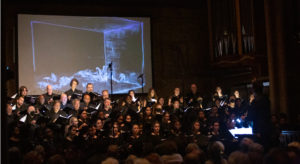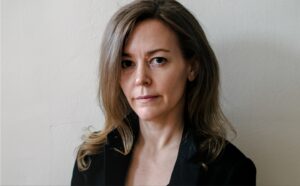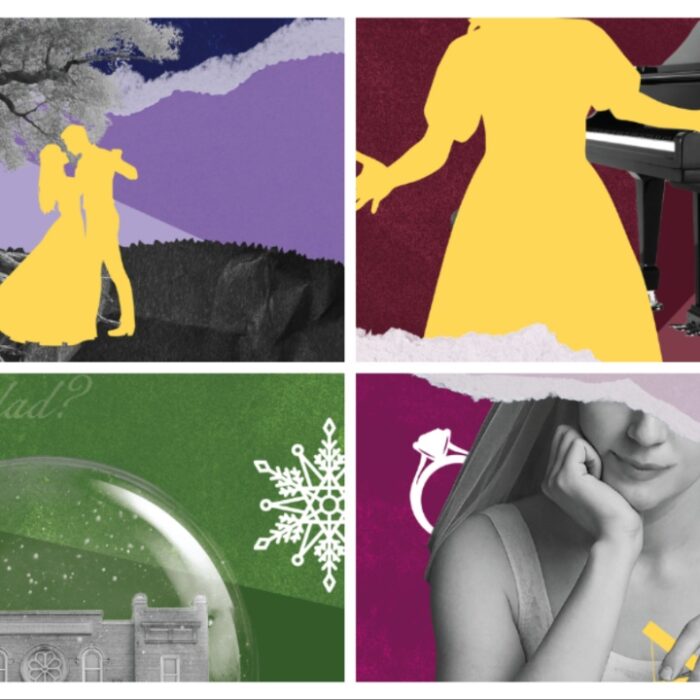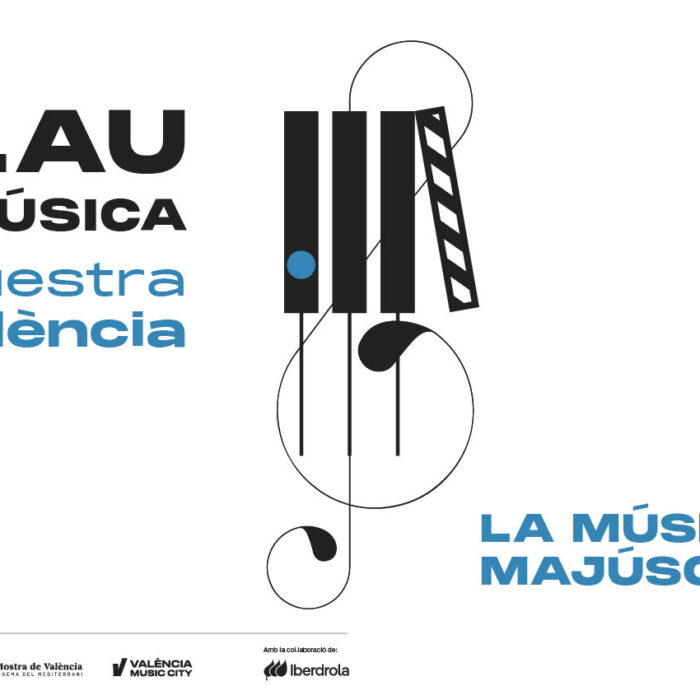
Voices of Ascension & the Young People’s Chorus of NYC Review 2022: Paola Prestini’s ‘The Glass Box’
By Jennifer PyronThe Voices of Ascension and the Young People’s Chorus of NYC performed composer Paola Prestini’s ‘The Glass Box’ in a highly anticipated program at the Church of the Ascension on November 9th. Prestini composed ‘The Glass Box’ in 2018, with text written by Royce Vavrek as an oratorio about young refugees in Sweden. This new work challenges perspectives and promotes thought-provoking questions about overcoming adversity and how we must bring attention to our world’s current and very painful crisis surrounding refugees.
Paola Prestini made a statement prior to the performance, saying, “‘The Glass Box’ is a concert work, with text by Royce Vavrek and live painting by Kevork Mourad, that follows the illness of young refugees in Sweden who fall into a coma-like sleep when their families are slated for deportation, a syndrome known as uppgivenhetssyndrom, or ‘resignation syndrome.’ Known only to occur in Sweden, the victims, called ‘de apatiska’ (the apathetic), withdraw from the world, their minds and bodies giving up on life. The only cure is the reversal of the government’s immigration decision. The experience is viewed from the perspective of both children and parents whose request for asylum is twice denied. Throughout the work, the sensory experience of the sleeping children is explored. A wall of children in their beds, in a deep sleep, paint an almost hallucinogenic portrait of the illness’s haunting effects. In the culmination of the work, the children slowly come out of their comas when news that the family has been granted permanent residence. These themes of otherness and the fragility of life for refugees hits close to home, as our own border reality, which is where I was raised, is complex and painful.”
Prologue (Glass)
An atmosphere of stillness was present as the floating tones of dissonant voices slowly emerged from the two choirs. There was a white noise of young voices hushing in the distance. They quietly whistled through what one might have described as an unconscious veil rising. Kevork Mourad’s illustration appeared on the projection screen. Outlined bodies clustered together with nameless faces and dark eyes. All was vast and empty in this moment as Prestini’s composition created a transparent body of sound, and Royce Vavrek’s words came to life.
“We float in a glass box
Holding our breath,
As taking air into our lungs
Would cause all things to shatter.
We float deep inside of the ocean.
The darkness of many fathoms
Suspended endlessly in stillness.
One word spoken
Could cause everything to shatter.
Water pours in
Through every crack.
Water pours in
Deep in the ocean.
We float in this state.
Our bodies shut down,
Sleeping without dreaming,
As our dreams of safety shatter.
We float in a glass box.”
A young voice sang the text “in a glass box” as audience members watched Mourad’s illustrations unfold into a story of containers holding conscious awareness, muted by a storm of the injustice felt by young refugees. Their request for asylum had been twice denied. Nothing made sense as to why, and so the symptoms of resignation took hold. It was in this liminal space between the heart and the mind where Prestini examined further how we, as a world, must do better by seeing the truth that is our current reality. A crisis. She brought front and center the fragility of life and the impermanence of all existence. Prestini gave a voice to the voiceless, beginning with “Prologue (Glass).”
Uppgivenhetssyndrom
Part I: Once upon a time
‘The Glass Box’ defined itself most as an introspective concert work in “Part 1: Once upon a time” when the double chorus portrayed a split-psyche. Prestini’s composition became the reflection of a child’s brilliant mind and a letter received by parents telling them to leave their homes. Royce Vavrek’s libretto was a mix of internal dialogues surrounding confusion, urgency, helplessness, and what it must have felt like when time stood still. Overwhelming shock gripped the young refugees.
“Once upon a time
Time stands still.
At the kitchen table
We translate
For our parents
‘Deportation.’
‘Leave’
Go where?
Might as well be the moon.
On the moon,
We’d be welcome.”
Part 2: Unwanted Refugees
“Part 2: Unwanted Refugees” had a slower tempo, with fewer voices, creating room for Kevork Mourad’s visual storytelling to go deeper. Audience members watched as a series of collected bodies formed mounds that synthesized the profound yet very disturbed sleep the children experienced as their bodies protested their hopeless reality. Here’s how Vavrek described their existence.
“In the homes of unwanted refugees,
The children sleep.
Not a peaceful sleep,
A shut-down sleep.
Our bodies revolting
Protesting,
Falling away from the world,
Losing the will to live.”
Part 3: Sacrifice & Part 4: Symptoms
“Part 3: Sacrifice” began with a moment of silence. Kevork Mourad illuminated ethereal bodies lifted from a glass box. A young voice sang the repeated phrase, “I sacrifice my consciousness.” Audience members were motionless as they watched and listened in reverence to the work. Both choirs exchanged an internal knowing through their voices that brought to the surface Prestini’s core and universal message about “home.” This invited the audience to discover for themselves how these young refugees might have felt in their sleep but, most importantly, asked questions about how we, as a world, plan to better care for our own painful refugee crisis. Royce Vavrek’s words detailed their symptoms.
“The soul takes flight to the world that is invisible…
An invisible world of sleep
Without swimming or running or flying or love.
Totally withdrawn.
Totally immobile.
Permanent residence
Is the only treatment.”
Part 5: Letters from Classmates, Part 6: Glass (reprise), Part 7: Lullaby & Part 8: Residence
The final four movements of ‘The Glass Box’ portrayed the memories of the young refugees in a dream-like state of shared moments, a time when they actually felt safe, loved, heard, and valued. Prestini’s composition alternated voices between a call and response that softened into a serene place of gentleness. “Part 7: Lullaby” was especially nostalgic and emotionally gripping.
“Part 8: Residence” shifted everything when the reversal of the government’s immigration decision finally came in a letter, and ‘The Glass Box’ concluded with “Epilogue (We are Refugees).” This new state of hope left audience members with new unanswered questions surrounding our own refugee crisis.
What must change in order for us to be more compassionate and caring? What choices do we make and actions do we take in order to make a positive difference right now? How can you and your community give a voice to the voiceless beginning today?
Categories
News


